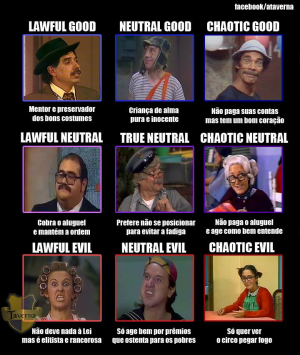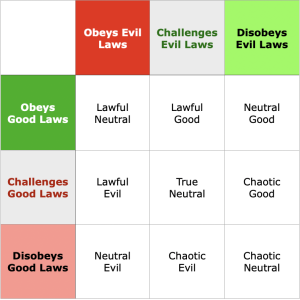Traditionally a D&D topic that seeped its way into all forms of media, morality alignment is something I find truly fascinating.
This is s topic thread dedicated to the philosophical questions that these alignments would imply.
What’s the objectively best moral trajectory? What’s the most appealing?
Is chaotic evil truly incapable of redemption? Is lawful good truly devoid of evil or is it a facade? Is neutral good really the best state of mind? Is chaotic good equally delusional? Why is chaotic neutral so fun to write? Is true neutral really that hard to nail down?
I want your answers!
Neutral Good is the objective "best" alignment. Something people forget is that Lawful Good is
Lawful Good. Not Good Good. The law is not always good, the law is not always just, and the law allows you to justify atrocities. If your Lawful Good Paladinner refuses to follow the fucked up aspects of the law, I'd argue they aren't LG.
Chaotic Neutral is the most fun to write because, by virtue of us being on the internet, odds are we're all stranger than most. We aren't normies, and we see through their bullshit. CN allows us to discard all of that and do whatever we want, rules be damned. NG is not inherently the best state of mind, because it makes you follow your own morality. It makes you the most likely to do good (CG is second), but doesn't inherently mean you will.
The most appealing alignments are evil. I have a Lawful Evil grave cleric, and her opinion is that only the dead matter. She despises the living and has no issue with taking their lives. But anyone dead deserves proper burial rites and respect, and looting the dead (even if you just killed them) is a no no. I also have a Chaotic Evil hexblade who RPs as a paladinner (she abuses the fact that her tiefling heritage allows her more access to fire), and calls any spells she imbues on her fan Smite Evil. She's calculating, because she can't allow the facade to be broken until her old party (who found this out, and she scarred one of them) returns. She's not irredeemable (that's my LE cleric), but she's a victim of circumstance. She wouldn't be that alignment if she weren't made that way by a society that hates people who can't work.
And since we're talking about Pathfinder WotR, I also have a character there! Lawful Neutral (whatever the fiery justice version is) Aasimar Hellbound Oracle. She's an Aeon, but she absolutely sucked ass at the job because she chose all of the "for the Greater Good!" justice options (that is, she ignored the laws of the land that punish the war effort in exchange for choosing whatever Meliles suggested, because he wanted to make the crusade likely to succeed) (Aeon is just you making your short-sighted copsona and having other short-sighted copsonas fellating you for playing cop in a way that makes the thing an Aeon should be against (the giant fucking worldwound) feel like it's secretly an Aeon creation with how hard you sabotage the war effort and get called a good girl for it). This makes her a great Devil, and leaves her at a crossroads: die and go to Hell as a dreg, go to Hell willingly as a Devil, or ensure that Hell would never want her, by becoming a Swarm That Walks. Take a guess what she chose.


